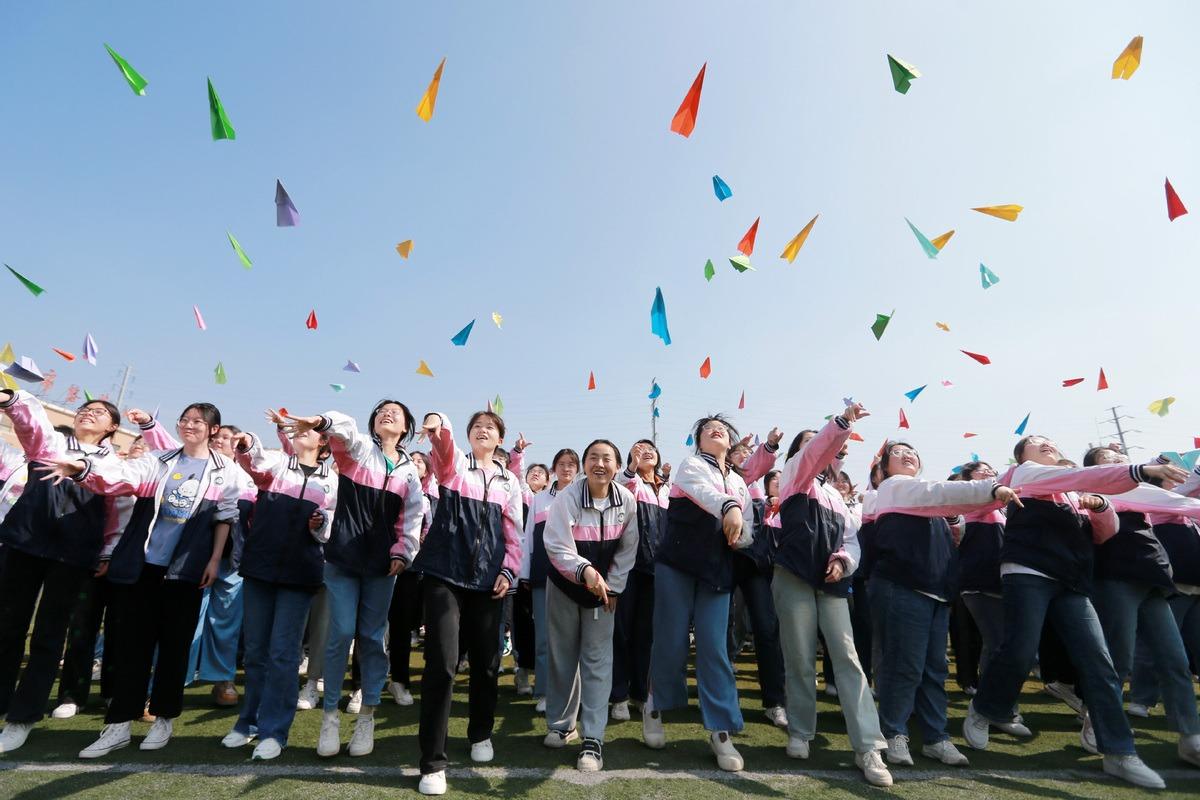Record number of gaokao participants to boost country's intellectual talent pool
 High-school seniors throw paper planes to beat the stress before the exam in Huaibei city, Anhui province, May 31, 2023. (PHOTO / XINHUA)
High-school seniors throw paper planes to beat the stress before the exam in Huaibei city, Anhui province, May 31, 2023. (PHOTO / XINHUA)
Nineteen-year-old Yang Min has complicated feelings about the upcoming national college entrance exam, or gaokao.
She is nervous, anxious and excited, but also hopes the exam can take her from a small city in Shanxi province to her dream university, China Foreign Affairs University in Beijing, and help fulfill her ambition of becoming a diplomat.
Yang, a senior high student from Shuocheng District No 1 Middle School in Shuozhou, has had a busy schedule in recent years, getting up before 6 am and going to bed after midnight to prepare for the "biggest test" of her life.
A record 12.91 million students around China are expected to take this year's gaokao, which starts on Wednesday and lasts two to four days, depending on the location. The number of participants is 980,000 higher than last year.
The increase in examinees reflects the improvement in the country's education system and the strength of high school education, experts said. With the overall college enrollment rate, including vocational colleges, reaching more than 80 percent and more students getting the opportunity to receive a higher education, the country will have a higher-quality talent pool to drive future development.
The Ministry of Education has asked local authorities to make the utmost efforts to try and ensure the exam takes place safely and fairly. It has worked with the Ministry of Public Security and the Ministry of Industry and Information Technology to crack down on attempts at cheating. Any students caught cheating will be dealt with seriously, the ministry said.
Targeted and scientific COVID-19 epidemic control measures have been put in place and extra test centers and monitors have been arranged.
Special arrangements have also been made to facilitate around 10,000 disabled students nationwide to take the exam.
A total of 29 provincial-level regions in China have started to reform the gaokao. Students will be allowed to choose more than a dozen combinations of subjects, instead of the two choices between liberal arts and science subjects as in the past, in accordance with their strengths and interests.
A special enrollment project launched in 2012, in which key universities increased their quota for those living in rural areas, has led to more than 950,000 students entering those universities over the past decade, the ministry said.
Zhang Wenjie, a senior high school student in Shanxi, said although he is not too nervous about the exam, he regards it as "the most important thing" in his life so far.
He wants to study the Chinese language, law or economics at Shanxi University, and said all his hard work will be worthwhile if he performs well in the exam.
Sun Fang, a teacher at Xishui County No 1 High School in Hubei's Huanggang city, said the gaokao is a major event not only for students, teachers and parents, but also for the entire county. People voluntarily change their behavior, such as keeping silent near the test venues, out of consideration for students taking the exam.
"Many of my students are from rural areas and are children of migrant workers whose parents work in cities to support their families," Sun said. "They have fewer opportunities to see the bigger world than their urban counterparts, so the gaokao offers them a great and relatively fair opportunity to move up the social ladder and change the destiny of themselves, their family and people around them," she said.


